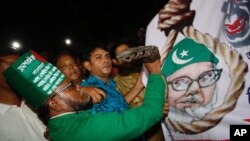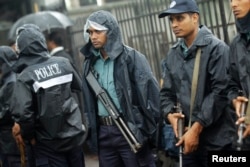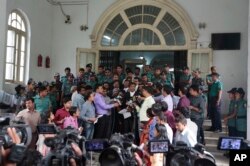Wednesday’s execution in Bangladesh of an Islamic political party leader, accused of committing crimes during the country’s 1971 war of independence to break away from Pakistan, has triggered mixed reactions in and outside the country.
Activists supporting Bangladesh’s war crime trials and the relatives of those who were killed have welcomed the execution of Motiur Rahman Nizami, head of the country’s largest Islamic party of Jamaat-e-Islami (JeI), calling him the mastermind behind the killings, rape and torture of many people during the war.
But some rights activists said that Nizami had been hanged following another “flawed trial” by the country’s International Crimes Tribunal (ICT).
Nizami was sentenced to death by the ICT in 2014 for his role in mass killing, rape and organizing the massacre of some intellectuals during the war.
The 73-year-old leader, who had been in prison since 2010, was hanged during the early hours Wednesday after the country’s Supreme Court last week rejected his final plea against the death sentence and he refused to seek mercy from the president of Bangladesh.
Soon after Nizami was executed, his supporters staged protests in Chittagong, Rajshahi and elsewhere across the country. To control the angry supporters police resorted to firing rubber bullets. At least 20 protesters were arrested, police sources said.
Some defend execution
After Nizami became the fifth senior opposition leader executed since 2013 for war crimes, Bangladesh’s home minister Asaduzzaman Khan Kamal said that with Wednesday’s hanging a “blot” was removed from the heads of freedom fighters of the country.
“We as freedom fighters find it satisfying to see another notorious war criminal punished. We thank our prime minister for ensuring justice in the war crime cases,” Kamal said.
Nizami was convicted for taking the lead role in the massacre of scores of top Bangladeshi intellectuals, among other war crimes.
Families of a number of war victims have welcomed Nizami’s execution.
Dr. Aleem Choudhury, an eye specialist, was killed by anti-independence Al Badr militia which Nizami was convicted of leading during the war. Following Nizami’s execution, Choudhury’s wife, Shamolee Nasreen Choudhury, said she felt she had gotten justice.
“Nizami took the lead role to prepare the list of top intellectuals of the time, including my husband. Those respected intellectuals were abducted from their homes and brutally tortured, before being murdered,” Choudhury, a key witness in the ICT trial, told VOA.
“For long 45 years we waited for justice. With Nizami’s execution a notorious mass murderer has been removed from this earth. I feel now that justice has been delivered," she said.
Tureen Afroz, an ICT prosecutor, denied the tribunal's actions were motivated by politics and that they were flawed.
"With his series of instigating speeches, Nizami encouraged Al Badr militants who indulged in the massacre and other heinous war crimes. With his execution Bangladesh has got rid of a mass murderer and moved one big step to deliver justice in all cases of war crimes in the country," Afroz told VOA.
Some say trials ‘flawed’
After Nizami was hanged, the leaders of JeI said that he had become a “martyr.”
“He has been denied justice and become another victim of the vicious political vendetta in the country,” Maqbul Ahmed, JeI’s acting head in Bangladesh said.
International rights groups, which have long campaigned that the war crime trials in Bangladesh fell short of global standards, have urged Bangladesh again to put a halt to executions of anyone accused of other war other crimes.
The death penalty is always a human rights violation, but its use is even more troubling when the execution follows a flawed process, said Champa Patel, director of Amnesty International’s South Asia regional office.
“The victims of the horrific events of the 1971 Liberation War are entitled to justice, but taking another life is not the answer," Patel said in a statement.
Phil Robertson, deputy director of Human Rights Watch’s Asia division believes Nizami's trial was “flawed.”
“Human Rights Watch supports accountability for war crimes, but the Bangladesh government seems determined to cut corners on the process, and then prescribe the death penalty, which we oppose in all cases as irreversible, and inherently cruel and degrading,” Robertson told VOA.
He pointed out there is no getting around the fact that the court allowed Nizami to call only four defense witnesses and prevented his legal team from questioning prosecution witnesses whose testimony had serious discrepancies.
“When a man’s life is at stake, such failures of free trial standards are simply not acceptable. Before anyone else is tried, the ICT needs to be thoroughly revamped so that its legal basis and procedures are in line with international fair trial standards,” Robertson said.











